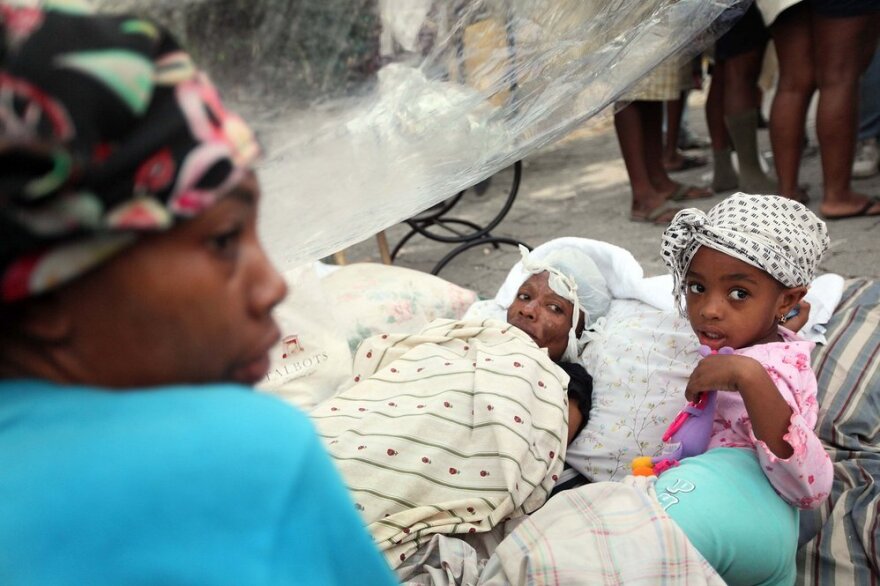First there was the violent seismic spasm, and then a continuing series of random temblors that keeps the survivors on edge.
But other dangers are beginning to emerge and multiply, say public health experts.
"I think there's going to be a series of health aftershocks," says Dr. Dan Fitzgerald of Weill-Cornell Medical College, who knows Haiti well.
He says for the next few days many more people will die from their untreated injuries, owing to infections as well as kidney failure that happens when protein from injured muscle spills into the bloodstream.
"That's sort of the first wave," Fitzgerald says. "The second wave will be a lack of clean water, housing and sanitation. So people are going to start suffering from diarrheal diseases [and] respiratory tract infections."
The third phase arrives when what little food there is runs out.
"Haiti's already one of the most food-insecure countries in the world," Fitzgerald says. "So people are going to start starving over the next week."
Fitzgerald predicts increasing social chaos.
"When you have 3 million people who are traumatized, have no clean water, no housing, no food — unfortunately, security is going to become a big issue," he says. "People are going to be fighting to survive."
Matthew Marek, the American Red Cross chief in Port-au-Prince, reports that the mood is turning dark and increasingly desperate. In a Skype interview Wednesday night from his small apartment — now the Red Cross' headquarters in Haiti — Marek surveyed an ominous dark sky and worried about what a drenching rainstorm would do, in terms of human misery in a population of 3 million living out in the open.
"The emotions are all over the place," Marek says. "There are frustrations. There are tensions. People are shocked. It's everything you could imagine. It looks like a bomb has gone off in Port-au-Prince."
Marek's testimony illustrates, yet again, how fragile and tenuous the pre-earthquake support structure was in Haiti.
As soon as the shaking stopped, Marek and his colleagues crawled out from under their desks and walked out "a new door in our office" where a wall used to be. They set up a makeshift triage clinic in the vacant lot next door, using scanty first-aid supplies on hand. Thousands of people lined up all night.
Within 24 hours, the Red Cross announced it had exhausted its medical supplies in Haiti.
While cleaning wounds and putting compresses on lacerations, Marek was trying to find out what had happened to six of his 15-member staff who were still unaccounted for last night.
Thursday, the first of an outpouring of international aid is beginning to trickle into Haiti, in an attempt to head off multiplying catastrophes. But Marek says the survivors are in for some harsh times.
"I don't think all of our good intentions [are] going to be able to relieve the effect that this tragedy has had," he says.
In other words, all the aid in the world won't be enough.
Copyright 2022 NPR. To see more, visit https://www.npr.org. 9(MDAzMjM2NDYzMDEyMzc1Njk5NjAxNzY3OQ001))





























